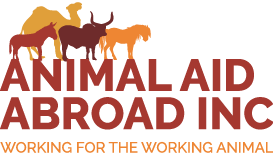Naina's Story
Hello, I'm Naina, I'm about fifteen years old and I've spent most of my life working at the brick kilns in the outskirts of Kathmandu. It was a very tough life, especially as I lost my sight very early on. I probably lost my sight due to infection incurred from the over exposure to dust in the kilns. Despite going through many adversities, I am now living out my retirement with the the kind people from Animal Nepal at the Donkey Sanctuary in Godavari.
Prior to coming here, me and three other donkeys and a horse had been living with a kind lady called Pauline in Kathmandu. Pauline had adopted us from Animal Nepal and we were living with her for a number of years. We had a very good life with Pauline, but sadly she had to go back to Switzerland so all five of us were then brought back to Godavari about three years ago. Although I did miss Pauline, it felt good to be back.
Now in my old age, I enjoy sunbathing and grazing in the mornings with my best donkey friend Menuka. She is elderly like me and not mischievous like the other younger donkeys, mules and horses, which I tend to find quite tiresome so on the whole I tend to avoid them. I also love being groomed and cuddled. Every time visitors come to the sanctuary, I'm usually the first donkey they meet and I have to admit, I absolutely love the attention!
Even though, life is good for me now, I cannot help but recall the traumas and hardship I experienced in the past and it makes me sad to think there are a million others like me across the world who have not been as lucky as me. When I was very young, I was separated from my mother and sold at an equine market in India. I was then brought across the border to Nepalgunj. I didn't really understand what was happening to me, everything was unfamiliar and I really missed my mum. Very soon, I was taken on another long trip on the back of a lorry. It was full of other donkeys and it was very crowded and hot in there. I was so thirsty but I couldn't find any water. Finally, we arrived in a new place, it was somewhere in the outskirts of Kathmandu. I was exhausted from my journey so I didn't think much about my new life and what it meant, all I wanted was to go to sleep.
The next morning, I was rudely awakened by a human with a stick and me and my equine friends were given heavy loads of bricks which we had to repeatedly carry for almost 10-12 hours a day. It was so very hot and the weight on my back was at times unbearable. I hoped that the humans would let us have a break and give us water and food but they were relentless in putting us to work. My friends and I were malnourished and we had open sores on our body. Worst of all, the humans would hit us with sticks to 'discipline' us and as a result some of my friends received very serious injuries and some even died from it. For me, working life was especially hard, because due to my lack of sight, I kept bumping into things and at times dropping my load. The humans did not like this at all and one day, my handler, in a fit of rage broke my left ear and it's still floppy to this day. I couldn't understand this cruelty and everyday I hoped for better days but I had also resigned myself to the fact that this was my lot and nothing was going to change.
However, I was one of the few lucky ones. I was rescued by Animal Nepal following their visit to the brick kiln where I was working. I was in a very bad state by then and never in my wildest dreams did I think that I would be allowed to leave that horrible place. When I first arrived at the sanctuary, I received so much love and care that it was very surreal for me and it took me time to get used to it all. I didn't realize that humans could use their hands gently to express love to us because I was only accustomed to receiving beatings from them.
I am so very grateful to people like Pauline and for the work that organisations like Animal Aid Abroad, the Donkey Sanctuary, Help Animals India and Animal Nepal are doing to help animals like me. I just hope that humans will find it within themselves to be kinder to animals and not subject us to all kinds of cruelty just because we cannot speak.
